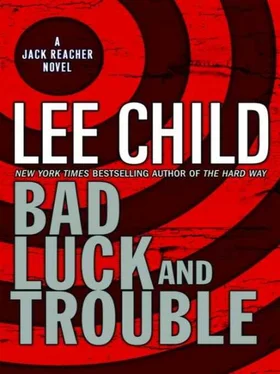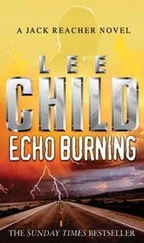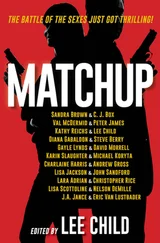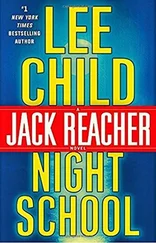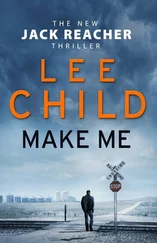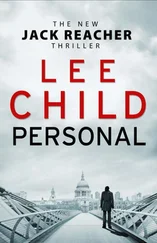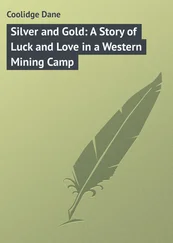“Music is inessential and baseball isn’t?”
“Baseball is a metaphor,” O’Donnell said. “An ace pitcher like Sandy Koufax, a man of great integrity, all alone on the mound, the World Series, stakes high, that’s how Franz wanted to see himself. He probably wouldn’t have articulated it exactly that way, but I can tell you his password would have to be a worthy repository for his devotion. And it would be expressed in a brusque, masculine fashion, which would mean a surname only.”
“So what would you vote for?”
“It’s tough, with only one try left. I’d look like a real fool if I were wrong. What are we going to find on there anyway?”
“Something he felt was worth hiding.”
Reacher said, “Something he got his legs broken for. He didn’t give up anything. He drove them into a fury. His office looks like a tornado hit it.”
“What’s our ultimate aim here?”
“Seek and destroy. Is that good enough for you?”
O’Donnell shook his head.
“No,” he said. “I want to kill their families and piss on their ancestors’ graves.”
“You haven’t changed.”
“I’ve gotten worse. Have you changed?”
“If I have I’m ready to change back.”
O’Donnell smiled, briefly. “Neagley, what don’t you do?”
Neagley said, “You don’t mess with the special investigators.”
“Correct,” O’Donnell said. “You do not. Can we get some room service coffee?”
They drank thick strong coffee out of the kind of battered electro-plated jugs found only in old hotels. They kept pretty quiet, but each of them knew the others were tracing the same mental circles, shying away from the last attempt at the password, examining the vector, trying to find another avenue forward, failing to, and starting all over again. Finally O’Donnell put his cup down and said, “Time to shit or get off the pot. Or fish or cut bait. Or however else you want to express it. Let’s hear your ideas.”
Neagley said, “I don’t have any.”
Reacher said, “You do it, Dave. You’ve got something in mind. I can tell.”
“Do you trust me?”
“As far as I could throw you. Which would be pretty damn far, as skinny as you are. Exactly how far, you’ll find out if you screw up.”
O’Donnell got out of his chair and flexed his fingers and stepped over to the laptop on the desk. Put the cursor in the box on the screen and typed seven letters.
Took a breath and held it.
Paused.
Waited.
Hit enter .
The laptop screen redrew.
A file directory appeared. A table of contents. Big, bold, clear and obvious.
O’Donnell breathed out.
He had typed: Reacher .
Reacher spun away from the computer like he had been slapped and said, “Ah, man, that ain’t fair.”
“He liked you,” O’Donnell said. “He admired you.”
“It’s like a voice from the grave. Like a call.”
“You were here anyway.”
“It doubles everything. Now I can’t let him down.”
“You weren’t going to in the first place.”
“Too much pressure.”
“No such thing as too much pressure. We like pressure. We thrive on pressure.”
Neagley was at the desk, fingers on the laptop’s keyboard, staring at the screen.
“Eight separate files,” she said. “Seven of them are a bunch of numbers and the eighth is a list of names.”
“Show me the names,” O’Donnell said.
Neagley clicked on an icon and a word processor page opened. It contained a vertical list of five names. At the top, typed in bold and underlined, was Azhari Mahmoud . Then came four Western names: Adrian Mount, Alan Mason, Andrew MacBride , and Anthony Matthews .
“Initials are all the same,” O’Donnell said. “Top one is Arab, anywhere from Morocco to Pakistan.”
“Syrian,” Neagley said. “That would be my guess.”
“Last four names feel British,” Reacher said. “Don’t you think? Rather than American? English or Scottish.”
“Significance?” O’Donnell asked.
Reacher said, “At first glance I would say one of Franz’s background checks came up with a Syrian guy with four known aliases. Because of the five sets of common initials. Clumsy, but indicative. Maybe he’s got monogrammed shirts. And maybe the phony names are British because the paperwork is British, which would get around the kind of scrutiny that American paperwork would invite over here.”
“Possible,” O’Donnell said.
Reacher said, “Show me the numbers.”
Neagley closed the word processor document and opened the first of seven spreadsheets. It was nothing more than a page-long vertical list of fractions. At the top was 10/12 . At the bottom was 11/12 . In between were twenty-some similar numbers, including a repeated 10/12 and a 12/13 and a 9/10 .
“Next,” Reacher said.
The next spreadsheet was essentially identical. A long vertical column, starting with 13/14 and ending with 8/9 . Twenty-some similar numbers in between.
“Next,” Reacher said.
The third spreadsheet showed more or less exactly the same thing.
“Are they dates?” O’Donnell said.
“No,” Reacher said. “Thirteen-fourteen isn’t a date whether it’s month-day or day-month.”
“So what are they? Just fractions?”
“Not really. Ten-over-twelve would be written five-over-six if it was a regular fraction.”
“They’re like box scores, then.”
“For the game from hell. Thirteen for fourteen and twelve for thirteen would imply lots of extra innings and a three-figure final score, probably.”
“So what are they?”
“Show me the next one.”
The fourth spreadsheet showed the same long vertical list of fractions. The denominators were pretty much the same as in the first three, twelves and tens and thirteens. But the numerators were generally smaller. There was a 9/12 , and an 8/13 . Even a 5/14 .
O’Donnell said, “If these are box scores, someone’s slumping.”
“Next,” Reacher said.
The trend continued. The fifth sheet had a 3/12 , and a 4/13 . The best was a 6/11 .
“Someone’s heading back to the minor leagues,” O’Donnell said.
The sixth list had 5/13 as its best score and 3/13 as its worst. The seventh and last was about the same, varying between 4/11 and 3/12 .
Neagley looked up at Reacher and said, “You figure it out. You’re the numbers guy. And Franz addressed all of this to you, after all.”
“I was his password,” Reacher said. “That’s all. He didn’t address anything to anyone. These aren’t messages. He’d have made it clearer if he was trying to communicate. These are working notes.”
“Very cryptic working notes.”
“Can you print them out for me? I can’t think without seeing them on paper.”
“I can print them in the business center downstairs. That’s why I stay in places like this now.”
O’Donnell asked, “Why would they trash an office to look for a list of numbers?”
“Maybe they didn’t,” Reacher said. “Maybe they were looking for the list of names.”
Neagley shut down the spreadsheets and reopened the word processor document. Azhari Mahmoud, Adrian Mount, Alan Mason, Andrew MacBride, Anthony Matthews .
“So who is this guy?” Reacher said.
Three time zones away in New York City it was three hours later in the day and the dark-haired forty-year-old man who could have been Indian, or Pakistani, or Iranian, or Syrian, or Lebanese, or Algerian, or Israeli, or Italian was crouching on a bathroom floor inside an expensive Madison Avenue hotel room. The door was closed. There was no smoke detector in the bathroom, but there was an extractor fan. The British passport issued to Adrian Mount was burning in the toilet pan. As always the inside pages went up easily. The stiff red covers burned slower. Page 31 was the laminated ID page. It burned slowest of all. The plastic curled and twisted and melted. The man used the hairdryer from the bathroom wall at a distance to fan the flames. Then he used the butt-end of his toothbrush to stir the ashes and the unburned flakes of paper. He lit another match and went after anything that was still recognizable.
Читать дальше
